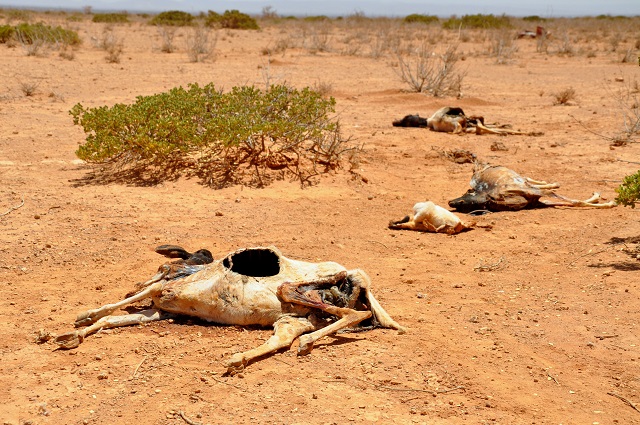
The Sunday News

Tinomuda Chakanyuka, Sunday News Reporter
AN estimated 1,4 million have been affected by drought in Bulawayo, Matabeleland North and South and the Midlands provinces, latest data from the United Nations shows.
The four provinces fall in the country’s natural regions four and five which are characterised by below average rainfall and poor yields. According to United Nations statistics, of the total number of people affected by drought in the four provinces, about 1 million are already receiving food aid.
Midlands Province is the worst affected where an estimated 630 000 people are drought afflicted with 350 000 of them already receiving relief assistance. In Matabeleland North Province 413 000 people have been affected by drought and all of them are receiving food aid. An estimated 225 000 people from Matabeleland South Province are being supported with relief assistance out of a total 340 725 affected by drought, while in Bulawayo 14 000 people are receiving food aid.
The exact number of people affected by drought in Bulawayo is yet to be established as a survey to ascertain the impacts of drought in urban areas in still underway. According to the latest Zimbabwe Vulnerability Assessment Committee (ZimVac) survey, an estimated 4,1 million rural Zimbabweans will be food insecure during the peak hunger period of January 2017.
The number is likely to increase after the vulnerability assessment programme being carried out in urban areas.
Stakeholders in the country’s drought mitigation programme met in Bulawayo recently and called for mobilisation of more funds towards alleviating food shortages, in light of the imminent increase in the number of people needing food assistance by January 2017.
The meeting was attended by more than 150 partners representing Government at central, provincial and district levels, traditional leaders, development partners and NGOs. Government has appealed for $360 million from the international community for drought response and about $190 million has been mobilised in the last five months through the United Nations.
World Food Programme country representative Mr Eddie Rowe said there was an urgent need for additional funding to cater for the most food insecure people through the January-March 2017 period.
“There is an urgent need for additional $111 million for the Food Security sub-sector to address the needs of the 1,9 million most food-insecure people through to the end of the lean season, in March 2017,” he said.
UN resident co-ordinator and United Nations Development Programme (UNDP) resident representative in Zimbabwe, Mr Bishow Parajuli echoed Mr Rowe’s sentiments. Mr Parajuli said humanitarian response in Zimbabwe had so far reached $1,5 million and pointed out the need to allocate more funding to non-food sectors. He also acknowledged the funding gap in the drought mitigation programme.
“There is still a funding gap of $160 million including in food and agriculture and other sectors such as water, sanitation and hygiene; health and nutrition; and protection. There is an urgent need to fund non-food sectors to ensure that the positive impact that has been achieved in food assistance is not affected by the inadequate funding in the other sectors,” he said.
Zimbabwe, like other countries in the Southern African region received bellow average rainfall as a result of the Elnino weather effect. The Zimbabwean Government has assured citizens that no one will starve.
@irielyan



